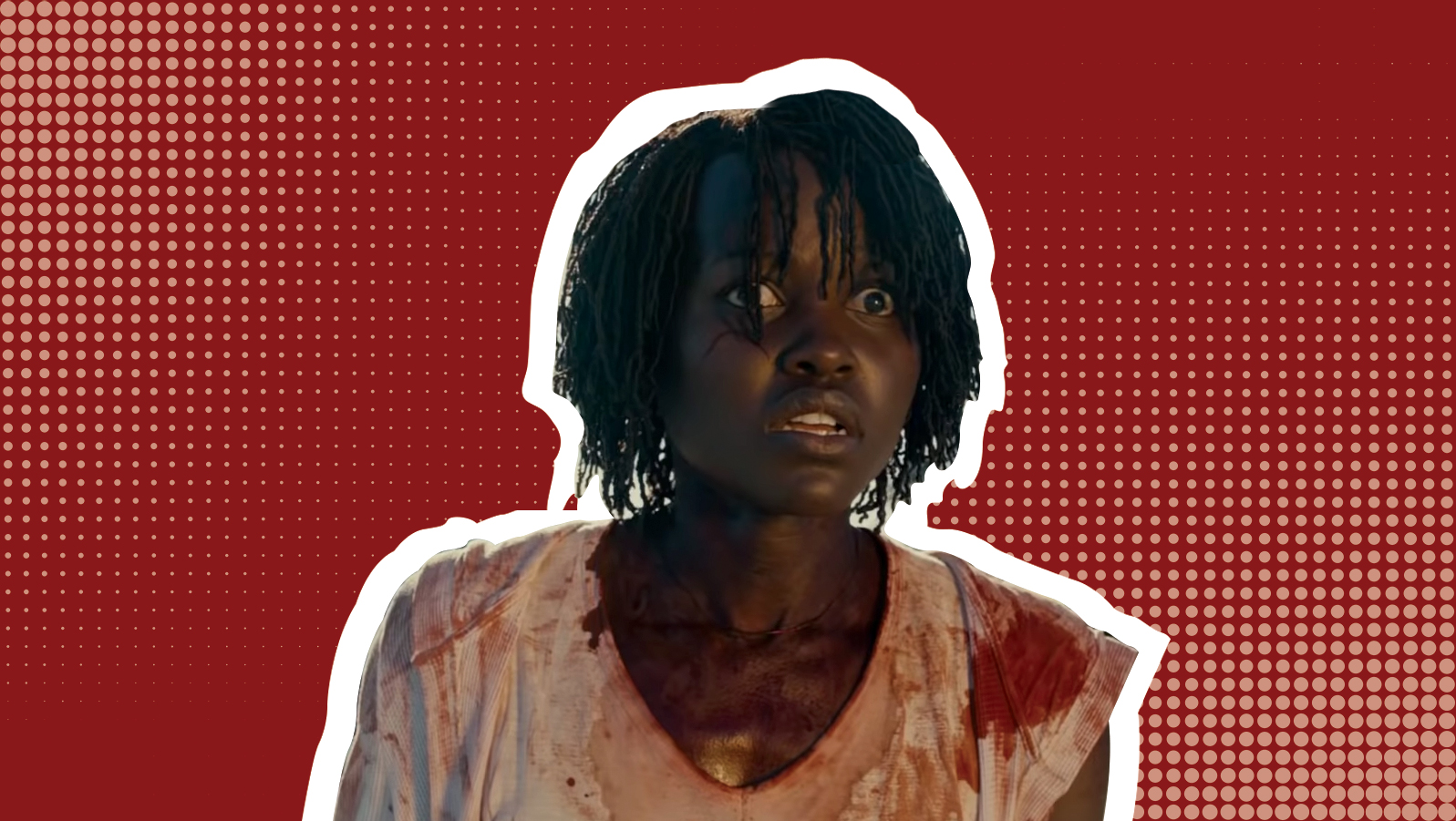Us captivated audiences from its very first trailer. There was the suspenseful, creepy plot. There was Lupita Nyong’o, staring deep into our souls. There was the creepy remix of “I Got 5 On It.” Somehow, calling Us the most anticipated movie of the year still feels like an understatement.
And now, with a giant box office haul, it’s inevitable that Us will dominate the cultural conversation for some time. To help move that conversation along, let’s look at Us through a very particular lens, as we ask: How queer is it?
What is Us?
Jordan Peele’s follow-up to his Oscar-winning Get Out follows a normal American family — the Wilsons — on one truly terrible summer trip to Santa Cruz. Adelaide Wilson (Lupita Nyong’o) once had a very bad time at the same spot when she was a kid. In a funhouse at a midway, she spotted her twin, and still feels haunted by this mirror match. The way she describes it to her husband Gabe (Winston Duke), it’s like the girl is getting closer and closer.
Of course, since this is a horror movie, she turns out to be exactly right: Red, her doppleganger, breaks into their house and comes for her. Unfortunately for the Wilsons, she’s not alone — the whole family has a pair. These are the Tethered, the shadows who mirror their moves. And the Tethered want to break the chains. The Wilsons’ vacation becomes a fight for survival.
How does it compare to Get Out?
Comparing them feels like folly — they’re two different movies — but comparisons are inevitable. At any rate, despite Peele’s aversion to calling Get Out a comedy, the earlier film is much more tongue-in-cheek than Us, largely thanks to Lil Rel Howery’s performance. Us is more traditional horror, though the few laugh lines do really work.
Do I need to go in spoiler-free?
I’d actually argue no, and I’m not the only one who thinks so. Us actually winds up explaining its premise a lot, despite said premise being . . . kind of obvious. The details are a little more in the weeds, sure. But if you’ve watched even one trailer, you probably have a pretty good idea of what to expect.
What’s interesting about the movie is how much it’s not about solving the mystery. In fact, I’d say trying to solve the “puzzle” of the film actually misses the point of the movie entirely (and I do think the marketing team behind Us has played up the mystery too much). It’s much more atmospheric than you’d expect.
What’s the queerest part of the movie?
There have been many great reads of Us already: on its place as a horror movie, on what it reveals about Black identity, as an allegory for Generation X, and more. But how about examining it through a queer lens? (This isn’t meant to detract from any other readings; this is merely one interpretation.)
As a queer man what really resonated with me was the way Us shows people in battle with themselves. The Wilsons are quite literally haunted by their shadows, and unable to escape. For someone who spent a lot of time living in the closet, this clicked for me. Granted, my gay self wasn’t trying to kill and replace my straight self, but the torment that comes with not being wholly united in personhood is quite familiar to me.
How is Lupita in it?
Incredible. If there’s any one reason to see Us, it’s Nyong’o. She gives an all-time great horror performance, effectively playing both hero and monster. As Adelaide, she’s a gentle woman, which makes her drift into a more intense performance as she fights for her life all the more shocking. As Red, Lupita adopts a gravelly tone of voice, a hoarse whisper that pairs perfectly with her wide-eyed, sinister grin. It’s a deeply affected performance, but in the best possible way. If her work isn’t in the conversation come awards time, it’ll be a gross oversight.
Is there anything in the movie that will elicit a particularly gay reaction — a scream, a gasp, a yas?
Watch for Elisabeth Moss — who plays the Wilson’s family friend Kitty — to grab some lip gloss. That’s all I’ll say.
Okay, assume I don’t care about spoilers. What’s this especially queer element you mentioned?
Well, you’d have to really not care, because I’m about to spoil the ending. Make sure you want to read on . . .
At the end of Us, Adelaide flashes back to her encounter with her Tethered in 1986. However, the memory we see isn’t Adelaide’s — it’s Red’s. Red successfully attacked Adelaide way back when, and trapped her in the tunnels. Then, Red went and took Adelaide’s place. Turns out, Adelaide has been a Tethered all along.
This is, to me, the richest point for queer interpretation. Red is permanently living in the closet as Adelaide, and has to kill her former self to maintain the facade — terrifying her son Jason in the process. She doesn’t remember who she really is, as she’s repressed it so deeply. Red finally remembers as she drives the family away to safety, but rather than admit she’s not really Adelaide, she chooses to continue to live the life she chose for herself over 30 years before. Red grins at Jason upon remembering, framing the ending as a victory for her — albeit a pyrrhic one.
So: How queer is Us?
I’d argue Us is quite queer, but not at all gay — an important distinction. Gay content does not always make for a queer movie (think Love, Simon), while movies without gay characters can still very much hit on queer themes. In this case, the battle with the self is inherently queer, and has me thinking about Us more than I thought I would be.


 Why you can trust Xtra
Why you can trust Xtra


